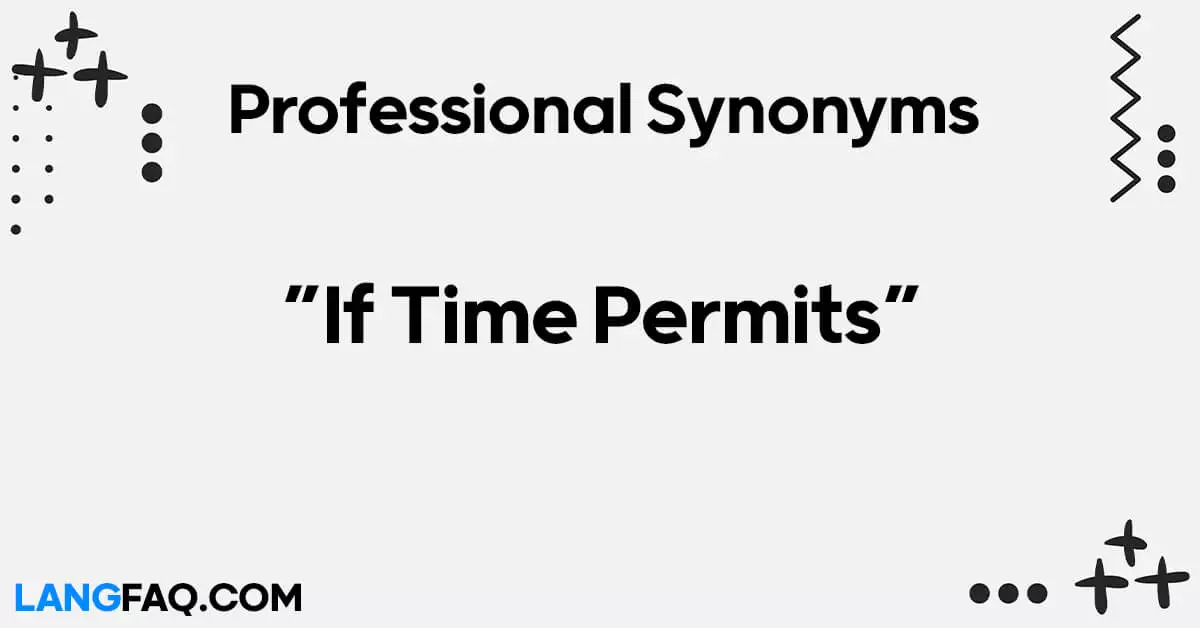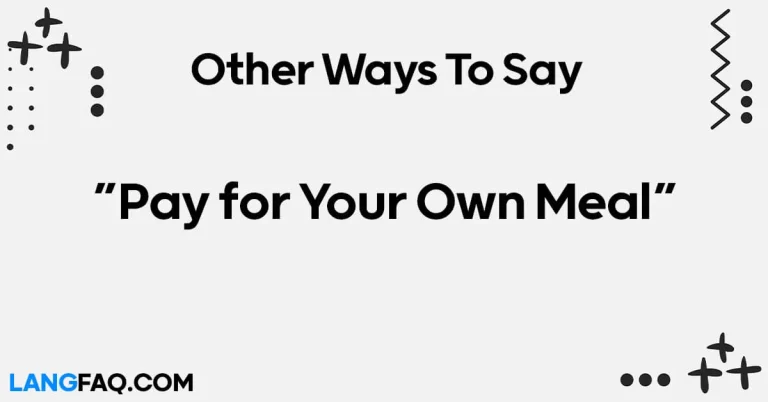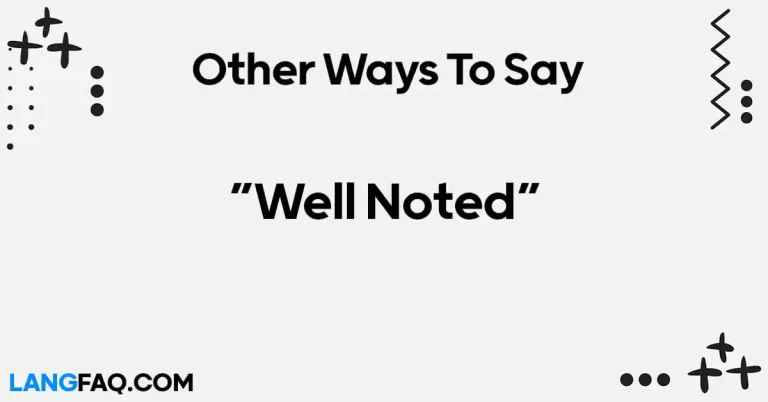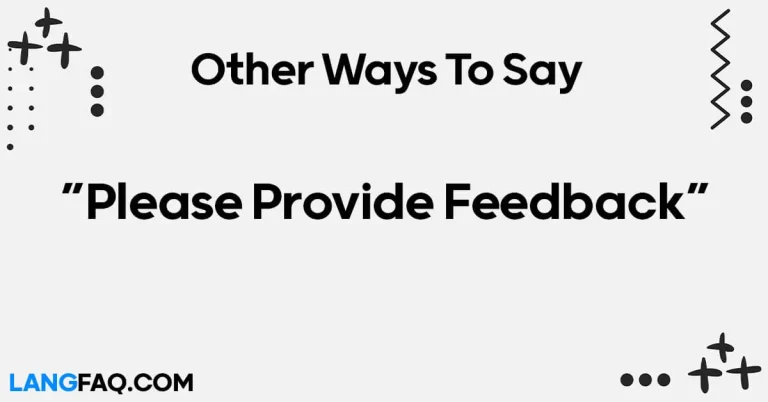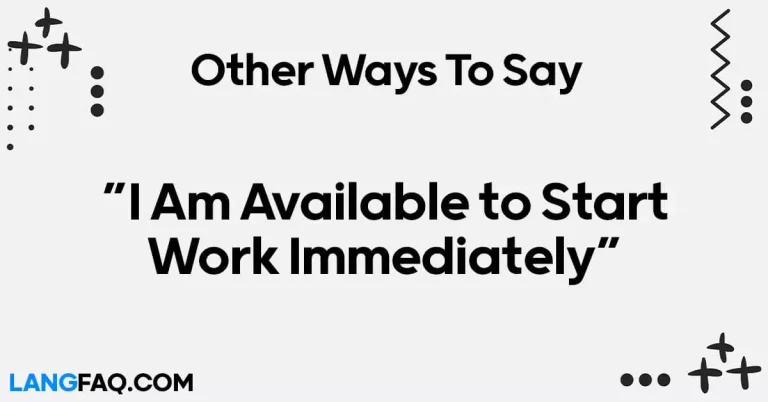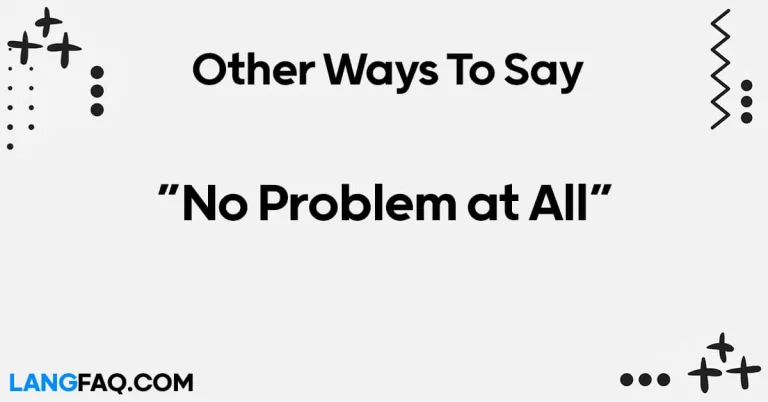“If time permits” is a phrase commonly used to indicate that something will only be done if there is enough time available. It implies that the task is not a priority and will only be completed if there is sufficient time left.
This phrase is often used in a professional or formal setting to convey that the completion of the task is not guaranteed.
Using synonyms for “if time permits” can help add variety to your language and make your writing more engaging. It also allows you to express the same idea in different ways, depending on the context.
Here are 12 good synonyms for “if time permits” that you can use in your writing:
- If circumstances allow
- If possible
- If feasible
- If conditions permit
- If it fits in
- If it works out
- If time allows
- If there is time
- If it is doable
- If it is manageable
- If it is practicable
- If it is within reason
To use these synonyms effectively, consider the tone and formality of your writing. Some of the synonyms may be more suitable for a formal setting, while others can be used in a more casual context. Additionally, think about the purpose of your writing and choose the synonym that best conveys your intended meaning.
Here are some examples of using synonyms for “if time permits” in different contexts:
- If circumstances allow, we will schedule a meeting with the client.
- We will address the issue if possible.
- The project will be completed if conditions permit.
- We can discuss the details if it fits in with your schedule.
- We will move forward with the plan if it works out.
- The report will be submitted if time allows.
- We will consider your proposal if there is time.
- I will attend the meeting if it is doable for me.
- The deadline can be met if it is manageable.
- The task will be completed if it is practicable.
- We can make changes to the design if it is within reason.
Key Takeaways:
Use alternatives for “if time permits” to convey a sense of flexibility and consideration for other factors. Synonyms for “if time permits” can add variety and nuance to your language, making your writing or speech more engaging.
Choose the appropriate synonym based on the context and tone of your message to effectively convey your intention.
What Does “If Time Permits” Mean?
When someone says “if time permits,” they are expressing a condition that relies on the availability of time. It is a way of indicating that an action or task will only be completed if there is enough time to do so. This phrase is often used when someone wants to prioritize other tasks or commitments but may consider doing something if time allows. It is a polite way of acknowledging that time is limited and other responsibilities take precedence.
Now, let me share an interesting historical fact with a similar tone. Did you know that the phrase “if time permits” can be traced back to ancient Rome? In Latin, the phrase “si tempus permittat” was commonly used by Roman officials to indicate that they would attend to a matter if their busy schedules allowed.
This phrase reflects the importance Romans placed on time management and prioritizing their obligations. So, the concept of “if time permits” has been ingrained in our language and culture for centuries!
Why Use Synonyms for “If Time Permits”?
Incorporating alternate terms for “if time permits” can enhance your communication by introducing variety and precision to your language. Instead of relying on a repetitive phrase, you can convey the same meaning in diverse ways, elevating the quality and professionalism of your writing or speaking.
Synonyms such as “if circumstances allow,” “given the opportunity,” or “when feasible” provide alternatives that maintain clarity while avoiding monotony. Utilizing different synonyms also showcases your mastery of language and ability to adapt your expression to different situations.
Ultimately, utilizing synonyms for “if time permits” adds nuance and sophistication to your communication.
12 Good Synonyms for “If Time Permits”
- When Feasible: When you have the opportunity to do so.
- If Circumstances Allow: Depending on the situation.
- As Time Allows: As your schedule permits.
- If It Fits My Schedule: If it can be accommodated within my timetable.
- When It’s Convenient: When it’s easy to do.
- Whenever Possible: At any suitable moment.
- If It’s Manageable: If it can be handled.
- Whenever Feasible: Whenever it’s possible to do.
- As Conditions Permit: Depending on the circumstances.
- If It’s Doable: If it’s possible to complete.
- When It’s Practicable: When it’s reasonable and achievable.
- As Resources Allow: As the available resources permit.
Now that we’ve explored these alternatives, you can use them in your conversations, emails, or writing to add variety and clarity to your communication.
In this section, we will explore 12 different ways to express the idea of “if time permits.” Sometimes, using the same phrase over and over can become monotonous and we may want to switch up our language.
These synonyms offer a variety of alternatives that can convey the same meaning in a more interesting and diverse way.
From “if circumstances allow” to “if it is within reason,” we will discover different ways to express the concept of “if time permits.”
When Feasible: Expanding Your Options
Usage in Formal Context:
In formal contexts, “When Feasible” is a great alternative to “If Time Permits” when you want to convey that something can be done when the opportunity arises. It adds a touch of professionalism to your communication.
Usage in Informal Context:
In informal settings, using “When Feasible” can make you sound more considerate and organized. It suggests that you are willing to accommodate others when it’s convenient for both parties.
Example Sentence (Formal): “In your proposal, please include a section on additional features that can be implemented when feasible.”
Example Dialogue Snippet (Informal): Friend 1: “Hey, can we catch up this weekend?” Friend 2: “Sure, let’s meet for coffee when feasible.”
Variations for Different Situations:
- In a mentor-mentee context: “We can schedule extra coaching sessions when feasible.”
- Among colleagues: “Team meetings can be rescheduled when feasible.”
Dictionary Insight: The Cambridge Dictionary defines “feasible” as something that is possible, reasonable, or likely to be achieved. It implies that an action can be carried out effectively.
When to Use: Use “When Feasible” when you want to express flexibility and willingness to accommodate without committing to a specific time.
Pros:
- Demonstrates flexibility and willingness to adapt.
- Sounds professional and considerate.
Cons:
- May be seen as vague in some contexts.
- Doesn’t provide a specific timeframe.
Tips:
- Use “When Feasible” in situations where you want to leave room for flexibility and adaptation.
If Circumstances Allow: Adapting to the Situation
Usage in Formal Context:
In formal communication, “If Circumstances Allow” is a sophisticated way of indicating that you are open to a particular course of action but are aware that external factors may influence the decision.
Usage in Informal Context:
In informal settings, using “If Circumstances Allow” can show that you’re flexible and understanding of the ever-changing nature of plans.
Example Sentence (Formal): “We will proceed with the project launch on June 1st, if circumstances allow.”
Example Dialogue Snippet (Informal): Friend 1: “Want to go hiking this weekend?” Friend 2: “Absolutely, if circumstances allow for good weather.”
Variations for Different Situations:
- In a mentor-mentee context: “We can schedule additional training sessions if circumstances allow.”
- Among colleagues: “Our team can plan a celebratory lunch if circumstances allow.”
Dictionary Insight: According to the Cambridge Dictionary, “circumstances” refer to the conditions and facts that are relevant to a situation.
When to Use: Use “If Circumstances Allow” when you want to express flexibility while considering external factors that may affect the outcome.
Pros:
- Shows adaptability and awareness of external factors.
- Adds a touch of formality to your communication.
Cons:
- Can be seen as indecisive in certain situations.
- May require additional clarification.
Tips:
- Pair “If Circumstances Allow” with a brief explanation to provide context.
As Time Allows: Managing Your Schedule
Usage in Formal Context:
“As Time Allows” is a formal alternative to “If Time Permits” that conveys your willingness to allocate time to a task when it fits within your schedule.
Usage in Informal Context:
In casual conversations, using “As Time Allows” can show your flexibility and willingness to make time for things that matter.
Example Sentence (Formal): “We will address the outstanding issues as time allows during the project development phase.”
Example Dialogue Snippet (Informal): Friend 1: “Can you help me with moving next weekend?” Friend 2: “Of course, I’ll assist as time allows.”
Variations for Different Situations:
- In a mentor-mentee context: “I’ll provide guidance and support as time allows in my schedule.”
- Among colleagues: “We can discuss the proposal details as time allows in our busy schedules.”
Dictionary Insight: The Cambridge Dictionary defines “allow” as giving permission or the opportunity for something to happen.
When to Use: Use “As Time Allows” when you want to express your willingness to accommodate tasks within your busy schedule.
Pros:
- Indicates flexibility and willingness to make time.
- Appropriate for both formal and informal settings.
Cons:
- May require clarification for specific scheduling.
Tips:
- Be prepared to discuss specific timeframes when using “As Time Allows” in formal contexts.
These synonyms for “If Time Permits” provide a valuable toolkit for enhancing your communication skills and sounding more professional in various settings. Let’s continue exploring more alternatives.
If It Fits My Schedule: Tailoring Your Time
Usage in Formal Context:
“If It Fits My Schedule” is a polite and professional way to indicate that you are open to an arrangement, provided it aligns with your existing commitments.
Usage in Informal Context:
In informal conversations, using “If It Fits My Schedule” can convey your willingness to make time for something without sounding overly formal.
Example Sentence (Formal): “We can discuss the project proposal on Monday if it fits my schedule.”
Example Dialogue Snippet (Informal): Friend 1: “Can we grab lunch tomorrow?” Friend 2: “Sure, I’m free after my meeting if it fits my schedule.”
Variations for Different Situations:
- In a mentor-mentee context: “I’ll offer guidance and support if it fits my schedule.”
- Among colleagues: “We can review the budget report if it fits our schedules.”
Dictionary Insight: The Cambridge Dictionary defines “fit” as to be the right size or shape, or to be suitable for a particular purpose.
When to Use: Use “If It Fits My Schedule” when you want to express your willingness to accommodate a request while considering your existing commitments.
Pros:
- Shows politeness and consideration.
- Suitable for both formal and informal interactions.
Cons:
- May require further discussion to determine a suitable time.
Tips:
- Be clear about your schedule constraints when using this phrase.
When It’s Convenient: Convenience is Key
Usage in Formal Context:
“When It’s Convenient” is a formal way to convey that something can be arranged when it’s most suitable for all parties involved.
Usage in Informal Context:
In informal conversations, using this phrase shows that you prioritize convenience and flexibility.
Example Sentence (Formal): “We can schedule the training sessions when it’s convenient for all team members.”
Example Dialogue Snippet (Informal): Friend 1: “Let’s plan a movie night.” Friend 2: “Sounds great! We can do it when it’s convenient for everyone.”
Variations for Different Situations:
- In a mentor-mentee context: “We can have our mentoring sessions when it’s convenient for both of us.”
- Among colleagues: “Let’s discuss the project updates when it’s convenient for the team.”
Dictionary Insight: The Cambridge Dictionary defines “convenient” as suitable for your purposes and needs and causing the least difficulty.
When to Use: Use “When It’s Convenient” when you want to emphasize flexibility and prioritize convenience for everyone involved.
Pros:
- Demonstrates consideration for others’ schedules.
- Suitable for both formal and informal communication.
Cons:
- Requires coordination to find a mutually convenient time.
Tips:
- Ensure clear communication and coordination to determine the most convenient time.
Whenever Possible: Maximizing Opportunities
Usage in Formal Context:
“Whenever Possible” is a formal phrase that suggests a commitment to taking advantage of opportunities whenever they arise.
Usage in Informal Context:
In casual conversations, using this phrase indicates your enthusiasm for seizing chances as they come.
Example Sentence (Formal): “We will conduct training sessions whenever possible to enhance our team’s skills.”
Example Dialogue Snippet (Informal): Friend 1: “Do you want to join the photography club?” Friend 2: “Absolutely! I’ll attend meetings whenever possible.”
Variations for Different Situations:
- In a mentor-mentee context: “We can have mentoring sessions whenever possible to support your growth.”
- Among colleagues: “Let’s discuss innovative ideas whenever possible during our brainstorming sessions.”
Dictionary Insight: The Cambridge Dictionary defines “possible” as able to be done or achieved, especially if it can be done or achieved in several ways.
When to Use: Use “Whenever Possible” when you want to convey a strong commitment to making the most of opportunities.
Pros:
- Expresses eagerness and commitment.
- Appropriate for both formal and informal interactions.
Cons:
- May require planning and coordination to maximize opportunities.
Tips:
- Be proactive in seeking and creating opportunities whenever possible.
If It’s Manageable: Assessing Feasibility
Usage in Formal Context:
“If It’s Manageable” is a formal way of expressing that you are open to a task or request as long as it can be handled effectively.
Usage in Informal Context:
In informal conversations, this phrase conveys a practical and approachable attitude towards accommodating requests.
Example Sentence (Formal): “We can take on the additional project if it’s manageable within our current workload.”
Example Dialogue Snippet (Informal): Friend 1: “Can you help me move next week?” Friend 2: “Sure, I’ll assist if it’s manageable for both of us.”
Variations for Different Situations:
- In a mentor-mentee context: “I’ll provide guidance if it’s manageable alongside your other commitments.”
- Among colleagues: “Let’s explore new projects if it’s manageable within our team’s capacity.”
Dictionary Insight: The Cambridge Dictionary defines “manageable” as capable of being successfully dealt with or controlled.
When to Use: Use “If It’s Manageable” when you want to express your openness to a request while considering its feasibility.
Pros:
- Emphasizes practicality and effectiveness.
- Suitable for both formal and informal discussions.
Cons:
- Requires an assessment of the task’s manageability.
Tips:
- Be prepared to discuss the specific aspects that make the task manageable or challenging.
Expanding your vocabulary with these alternatives for “If Time Permits” allows you to communicate more effectively and adapt to various situations. Let’s explore more synonyms to further enhance your language skills.
Whenever Feasible: Embracing Opportunities
Usage in Formal Context:
“Whenever Feasible” is a formal phrase that signifies a commitment to seizing opportunities whenever they arise, given the right circumstances.
Usage in Informal Context:
In informal conversations, using this phrase reflects an eagerness to make the most of chances as they come along.
Example Sentence (Formal): “We will incorporate client feedback whenever feasible to improve our services.”
Example Dialogue Snippet (Informal): Friend 1: “Want to try a new restaurant this weekend?” Friend 2: “Absolutely! Let’s explore new places whenever feasible.”
Variations for Different Situations:
- In a mentor-mentee context: “I’ll provide guidance and support whenever feasible to help you grow.”
- Among colleagues: “Let’s explore innovative projects whenever feasible to stay competitive.”
Dictionary Insight: The Cambridge Dictionary defines “feasible” as something that is possible, reasonable, or likely to be achieved.
When to Use: Use “Whenever Feasible” when you want to convey a strong commitment to embracing opportunities as they arise.
Pros:
- Expresses enthusiasm and dedication.
- Appropriate for both formal and informal interactions.
Cons:
- Requires a proactive approach to identify and utilize opportunities.
Tips:
- Stay alert and proactive in recognizing and acting on opportunities whenever feasible.
As Conditions Permit: Adapting to Circumstances
Usage in Formal Context:
“As Conditions Permit” is a formal way of indicating that you are open to a particular course of action, depending on the prevailing circumstances.
Usage in Informal Context:
In casual conversations, using this phrase shows that you are adaptable and willing to adjust based on the situation.
Example Sentence (Formal): “We will proceed with the project timeline as conditions permit.”
Example Dialogue Snippet (Informal): Friend 1: “Can we plan a beach day?” Friend 2: “Sure, we’ll go to the beach as conditions permit for the perfect weather.”
Variations for Different Situations:
- In a mentor-mentee context: “I’ll provide guidance and feedback as conditions permit based on your progress.”
- Among colleagues: “We can finalize the budget allocation as conditions permit, considering market trends.”
Dictionary Insight: The Cambridge Dictionary defines “conditions” as the particular state that something or someone is in at a specific time.
When to Use: Use “As Conditions Permit” when you want to convey flexibility and adaptability, taking into account the current situation.
Pros:
- Demonstrates adaptability and consideration of external factors.
- Suitable for both formal and informal discussions.
Cons:
- May require monitoring and assessment of changing conditions.
Tips:
- Keep an eye on the evolving circumstances to make informed decisions as conditions permit.
If It’s Doable: Assessing Feasibility
Usage in Formal Context:
“If It’s Doable” is a formal way of expressing that you are open to a task or request if it can be accomplished effectively.
Usage in Informal Context:
In informal conversations, this phrase conveys a practical and approachable attitude toward accommodating requests.
Example Sentence (Formal): “We can take on additional responsibilities if it’s doable within our current workload.”
Example Dialogue Snippet (Informal): Friend 1: “Can you help me with my DIY project?” Friend 2: “Of course, I’ll assist if it’s doable and within our skills.”
Variations for Different Situations:
- In a mentor-mentee context: “I’ll provide guidance if it’s doable and aligns with your goals.”
- Among colleagues: “We can explore new projects if it’s doable within our team’s expertise.”
Dictionary Insight: The Cambridge Dictionary defines “doable” as possible to achieve or complete.
When to Use: Use “If It’s Doable” when you want to express your openness to a request while considering its feasibility and practicality.
Pros:
- Emphasizes practicality and effectiveness.
- Suitable for both formal and informal discussions.
Cons:
- Requires an assessment of the task’s feasibility and resources.
Tips:
- Be prepared to discuss the specific aspects that make the task doable or challenging.
Expanding your vocabulary with these alternatives for “If Time Permits” empowers you to communicate more effectively and adapt to various situations. These phrases convey your willingness to accommodate, adapt, and make the most of opportunities, all while maintaining a positive and engaging tone. Let’s continue exploring more synonyms to further enrich your language skills.
How to Use These Synonyms Effectively?
To effectively utilize the synonyms for “if time permits,” follow these steps:
- Understand the context: Determine the appropriate situation to employ these synonyms.
- Select the right synonym: Consider the tone and formality required for your communication.
- Consider the connotation: Each synonym may convey a slightly different meaning or level of urgency.
- Use synonyms strategically: Vary your word choice to avoid repetition and add variety to your writing or speech.
- Practice: Incorporate these synonyms into your conversations or writing to become more comfortable employing them.
- Review and revise: Evaluate the impact of your word choice and make adjustments as necessary for clarity and precision.
Examples of Using Synonyms for “If Time Permits”
When it comes to finding alternatives for the phrase “if time permits,” there are several options to choose from. Here are a few examples:
- “If circumstances allow”
- “When there is a window”
- “Should the opportunity arise”
- “In the event of available time”
- “Given the chance”
- “In case of a spare moment”
- “Whenever feasible”
- “As and when feasible”
- “If the schedule allows”
- “When there is a lull”
- “Time permitting”
- “If the calendar is clear”
Pro-tip: To add variety to your writing, try incorporating these synonyms into your daily vocabulary. It will help you communicate more effectively and avoid repetition.
Frequently Asked Questions
What are some good synonyms for “if time permits”?
Some good synonyms are “if your schedule allows,” “if there’s time,” “unless time should run out,” “find the time,” “have the time,” and “work correspondence.” Other options include “unless time should run out,” “time aside,” and “optional activity.”
Is “if time permits” appropriate for formal settings?
Yes, “if time permits” is grammatically correct and suitable for professional settings. Other options like “if your schedule allows” and “unless time should run out” can also be used in formal settings.
Can “if time permits” be used in informal circumstances?
While technically grammatically correct, “if time permits” may sound strange in informal circumstances. It is recommended to use more casual alternatives like “if there’s time” or “unless time should run out.”
What are some examples of “if time permits” being used in a sentence?
Examples include “If time permits, I will turn in my report next week,” “I will attend the dinner reservation if my schedule permits,” and “If time permits, I will visit the candy store at the mall.” Other examples can be found in the Cambridge Dictionary or Merriam-Webster.
Are there any other phrases that can be used interchangeably with “if time permits”?
Yes, “if there’s time” and “unless time should run out” can be used interchangeably with “if time permits.” However, it is important to consider the appropriate usage depending on the setting and audience, as some alternatives may sound strange or be too casual in certain situations.
Is it grammatically correct to use “if time permits”?
Yes, “if time permits” is a grammatically correct phrase. However, it is important to use it in the correct context and consider different alternatives depending on the situation and audience.

